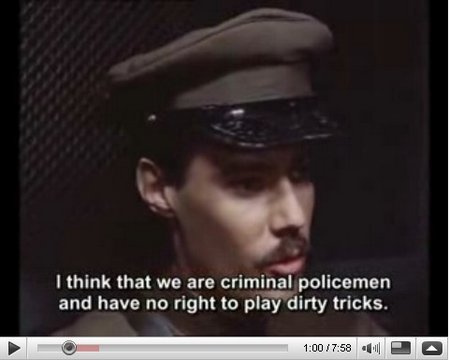During the late 1950s and early 60s, while other kids learned to fear nuclear holocaust, I learned to fear the midnight knock on the door. Not that I had to fear it personally, but my mother and grandfather made me aware that such things happened to other people in other parts of the world and there was no reason it couldn’t happen in our country someday, too. There were some bad dreams about it, though nothing vivid enough to remember now.
I did learn about the threat of nuclear weapons, too, at school. I remember “On the Beach,” which was frightening enough, but I’ve always thought the midnight knock on the door would be even worse. And I’ve long had a morbid fascination with the prison-camp genre of literature. I always read this stuff looking for pointers that might be helpful when it comes to our country.
I say all this by way of introduction to “Tomorrow Was The War”. I’ve watched 3 of the 9 parts so far. I had thought I was inured to this kind of story by now. Some months ago I watched an interview with Aleksandr Askoldov (director of Komissar) where he described how as a five-year-old, the police came for his mother, whom he never saw again. They would have come for him, too, had he not run away. Extremely fascinating, but I’m afraid it was no longer terrifying. And there are Russian movies that try to convey the effect of the fear of the police during the worst of Stalin’s days.
But Parts 1 through 3 of “Tomorrow Was The War” had a way of making it terrifying like it has never been before. I can’t say for sure how director Yuri Kara did it. It has something to do with how we first get to know the young adolescents who see it happening, but that sounds too trite.
I’m watching this film slowly on YouTube, savoring every segment before going on to the next. Maybe I’ll eventually get some clues as to how it is done. (I don’t know that I’ll listen to Vivaldi’s “Four Seasons” ever again without seeing this movie in my mind.)
I see that Yuri Kara was also the director of “The Master and Margarita.” In a way I don’t like that series. I read somewhere about an Old Believer who smashed a monument to author Mikhail Bulgakov, or some such thing, because of the blasphemy contained in this work. I say the vandal was justified in doing so. He had a legitimate point. But I also have to say that the movie is one of the greatest productions ever.
There is no English language Wikipedia page for Yuri Kara, but I’ve got to find out what else he has done.
Hmmm. While googling for information, I came across this book:
Kinoglasnost: Soviet Cinema in Our Time, by Anna Lawton (1992). I’ll have to read that. Here is the description on Google Books:
In this pioneering study, Anna Lawton examines the fascinating world of Soviet cinema under Glasnost and Perestroi-ka. She shows how the reforms that shook the foundations of the Bolshevik state and profoundly affected economic and social structures have been reflected by changes that revolutionized the film industry and in the films the industry produced. Lawton discusses the restructuring of the main institutions governing the industry; the abolition of censorship; the emergence of independent production and distribution systems; the problems connected with the dismantling of the old bureaucratic structure and the implementation of new initiatives. She also surveys the films that remained unscreened for decades for political reasons, films of the new wave that look at the past to search out the truth, and those that record current social ills or conjure up a disquieting image of the future. Together they portray a society in search of its roots and of new directions.
Now the question. Should I go out and get that book to read now, or should I first watch more of these films without someone else putting ideas about them in my head? It’s interesting to have a whole new world open to me one piece at a time as I get into this stuff. I kind of hate to give up my naivete just yet.
